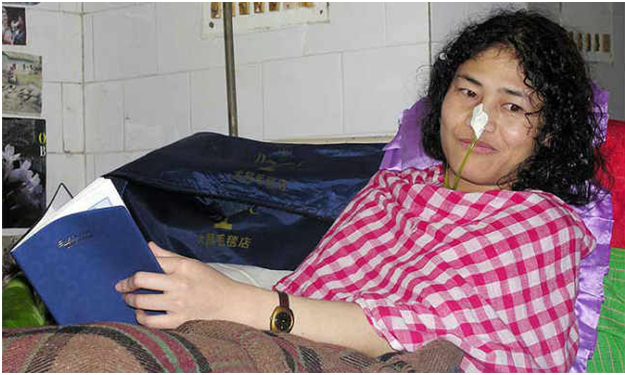Mixed Response in N-E to Irom Sharmila's Decision to End Fast

ITANAGAR: On July 26, Irom Chanu Sharmila delivered a shocker when she announced that she would be ending her fast against the implementation of the Armed Forces (Special Powers) Act (AFSPA) on August 9, just three months short of her fast’s 16th year anniversary.
Often called the ‘Iron Lady of Manipur’, Sharmila began her fast in November 2000 after ten civilians were killed by security forces in Malom town at Imphal Valley in Manipur. A fast that was triggered by a deep sense of sorrow has lasted more than 15 years and seen the 28 year-old Sharmila turn 44. During the last 16-plus years, she has been confined to a hospital under arrest and force-fed through her nose. She has been released and arrested on numerous occasions and has refused to enter her home or meet her mother until AFSPA is repealed.
In 2014, she was approached by at least one political party to contest the general elections which she turned down. Surprisingly, this past Tuesday, she announced her intention to end her fast and contest the state elections.
Reactions to her announcement have been mixed so far. While there are many who have respected her decision, there are some in Manipur who are unhappy but have not gone on record to voice their displeasure. Opinions also stand divided across the region on how her announcement will impact the implementation of the AFSPA and the implications of the fight against the Act.
The Act, which has repeatedly been termed as draconian by human rights activists, is currently implemented in the whole of Assam, Nagaland, Jammu & Kashmir, Manipur (except Imphal municipal area), Arunachal Pradesh’s Tirap, Changlang and Longding districts plus a 20-km belt bordering Assam, and Meghalaya’s 20-km area bordering Assam.
In all of these places, alleged excesses by security forces have been reported. And while in some places voices against the Act have been more vocal than in others, most are clear in their stance.
Imphal-based human rights activist, Babloo Loitongbam of the Human Rights Alert, says that the route ahead is tough but that it is “probably better than knocking your head against the wall, which has not worked”.
However, he also informs that Sharmila’s announcement is being viewed with some amount of scepticism in Manipur by some civil society organisations although they have not come out with a public statement on the issue yet.
Loitongbam however, is not too concerned by those criticising her announcement and says that “many of these people criticising her can’t spend half-an-hour coming out for an AFSPA rally, so it’s alright”.
“She has given 16 years of her life and it is within her right to think she’s done enough and if she wants to experiment with another (direction),” he says.
His support and admiration is not the only one coming from Manipur as other activists too have voiced similar opinions.
“Sharmila took an independent position when she fasted and has never been swayed by any group. And she is a symbol of a single individual trying to bring change singularly,” another Imphal-based rights activist says.
Outside of Manipur too, opinions are divided.
In Arunachal Pradesh, Dr Nani Bath, a professor at the Rajiv Gandhi University, is doubtful if her decision will change anything on the ground.
“I don't see any change in the government's stand or overall situation,” he remarks.
Bamang Tago of the Arunachal Citizens Rights feels that “16 years without a response from the Government of India is enough contribution” and that perhaps Sharmila feels she can try and change things by sitting with lawmakers instead.
Ironically, one MLA from Arunachal (who did not wish to be named), says that “getting into active politics will dilute her cause”.
He feels that even though 16 years of fasting has not changed anything, it “has created an impact in the public’s perception” of the nature of the Act.
In Assam, Nirod Daimari, who has also been fighting for the repeal of the Act, feels slightly let down by Sharmila’s announcement.
“For us it is a little discouraging since we started our campaign just two years back and we were inspired by her in many ways,” informs Daimari who has been actively working in Assam’s Bodoland Territorial Area that includes Baksa, Chirang, Kokrajhar and Udalguri districts which have been marked by violence over the past many years.
Even though he feels discouraged, Daimari exercises caution and adds that Sharmila’s decision to enter politics is “not a bad one either”.
But perhaps no one is more cautious than U Nobokishore Singh.
Based in Imphal, Singh is the convenor of the North East Dialogue Forum, a network of NGOs from the region that was formed in 2000.
Stating that Sharmila hasn’t actually yet given up her fast and will make a decision on August 9, Singh says that the 16 years of confinement may have affected her ability to express herself clearly.
He says that “she is very clearly indicating that her struggles of non-violence if it is useless in a democratic country like India it is better to stop this struggle and find an alternative” but that it is the “alternative that she is not able to explain properly”.
Singh also jumps to her defence and says that Sharmila isn’t just seeking the repeal of AFSPA from Manipur but from the entire country.
“She often refers to her locality and people misinterpret that as being confined to Manipur alone,” he says.
While he says that there will be some degree of discouragement amongst rights activists if she breaks her fast, Singh also says that the bigger struggle must continue.



